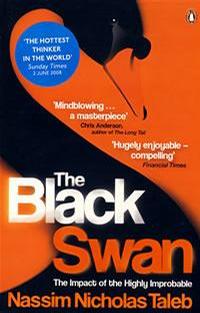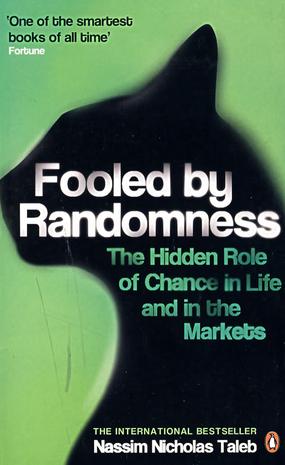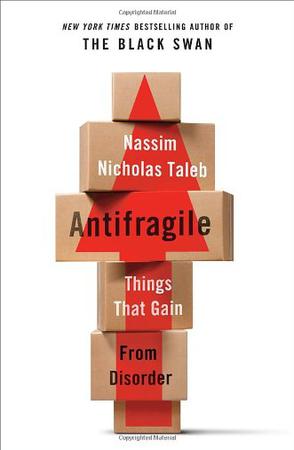-

The Bed of Procrustes
By the author of the modern classic The Black Swan, this collection of aphorisms and meditations expresses his major ideas in ways you least expect. The Bed of Procrustes takes its title from Greek mythology: the story of a man who made his visitors fit his bed to perfection by either stretching them or cutting their limbs. It represents Taleb’s view of modern civilization’s hubristic side effects—modifying humans to satisfy technology, blaming reality for not fitting economic models, inventing diseases to sell drugs, defining intelligence as what can be tested in a classroom, and convincing people that employment is not slavery. Playful and irreverent, these aphorisms will surprise you by exposing self-delusions you have been living with but never recognized. With a rare combination of pointed wit and potent wisdom, Taleb plows through human illusions, contrasting the classical values of courage, elegance, and erudition against the modern diseases of nerdiness, philistinism, and phoniness. -

The Black Swan
`Great fun ... brash, stubborn, entertaining, opinionated, curious, `Hugely enjoyable - compelling' `Idiosyncratically brilliant' `A fascinating study of how we are regularly taken for suckers by the unexpected' `A deeply intelligent, provocative book' 'Like the conversation of raconteur ... hugely enjoyable - compelling ... Beware the Black Swan' --This text refers to an out of print or unavailable edition of this title. 'The Black Swan confirms his status as a guru for every would-be Damien Hirst, George Soros and aspirant despot' --This text refers to an out of print or unavailable edition of this title. 'A deeply intelligent, provocative book ... Taleb succeeds in bringing sceptical empiricism to the masses' --This text refers to an out of print or unavailable edition of this title. 'A richly enjoyable read with an important message' --This text refers to an out of print or unavailable edition of this title. 'A provocative macro-trend tome in the tradition of The Wisdom of Crowds and The Tipping Point' --This text refers to an out of print or unavailable edition of this title. -

Fooled by Randomness
《财富》评选的75本商务人士必读书之一。股市的大起大落只发生在须臾之间,借鉴塔勒布的操作手法(这也是不少操盘手正在做的),您将能避免风险,并在黑天鹅出现时大赚一笔。说股票交易者应该人手一册本书绝对不过分。 人的本性经常低估随机现象,我们很需要这样的书。妙趣横生、清新隽永且独具一格,令人玩味无穷。——罗伯特·希勒(畅销书《非理性繁荣》作者) 本书常识性知识俯拾即是。如果你是交易员、科学家,或者哈佛律师,本书必读。——保罗·威尔莫特(《衍生性金融商品》作者) 简单一句话:这本书让人看得入迷。埋首其中,你对生命(以及你的钱财)的了解将大为增进,这可不是随机性的结果。——伯恩斯坦(彼得·伯恩斯坦公司总裁) 当还是股市中的一位菜鸟级别的交易员时,作者塔勒布曾成功地在一次股灾中得以幸免,他潜心半年研究这场风暴,认为他的逃脱不是有比其他人高明之处,完全是运气好——运气在金融市场中起着重要的作用,但是人们却总是过低地估计了随机作用,忍不住想对事物做出自己的解释,这就形成了种种迷信。由此他写作了这样一部关于运气——随机性的书。 塔勒布指出:在基因上,我们仍和未开化的土著人很接近。我们的信念的形成,充满着迷信──即使现今也不例外(或许必须说,尤以今天为甚)。某一天,原始部落的某个人抓了鼻子之后不久,雨开始下了,于是他煞费苦心发展出一套抓鼻子祈雨的方法。同样的,我们会把经济的繁荣归功于联邦储备委员会降低利率;或者一家公司经营成功,竟和新总裁“走马上任”有关。类似风马牛不相及的事件屡屡被我们扯上联系,并导致我们在人生的重要抉择关头步步踏错,先机尽失。 生活中随机性无处不在,即使是专业的数学家,并精于概率的计算,也往往会被随机性所捉弄,塔勒布最后建言:我们虽然无法避免随机性,但我们可以学着接受它。塔勒布的理念已经自成一派,世界上相当多的股票交易员都承认受到他理念的影响——从稀有事件中获取收益。这绝对是每一位证券交易者都应该珍藏的一本书! Everyone wants to succeed in life. But what causes some of us to be more successful than others? Is it really down to skill and strategy – or something altogether more unpredictable? This book is the word-of-mouth sensation that will change the way you think about business and the world. It is all about luck: more precisely, how we perceive luck in our personal and professional experiences. Nowhere is this more obvious than in the markets; we hear an entrepreneur has ‘vision; or a trader is talented;, but all too often their performance is down to chance rather than skill. It is only because we fail to understand probability that we continue to believe events are non-random, finding reasons where none exist. This irreverent bestseller has shattered the illusions of people around the world by teaching them how to recognize randomness. Now it can do the same for you. -

Antifragile
From the bestselling author of The Black Swan and one of the foremost thinkers of our time, Nassim Nicholas Taleb, a book on how some things actually benefit from disorder. In The Black Swan Taleb outlined a problem, and in Antifragile he offers a definitive solution: how to gain from disorder and chaos while being protected from fragilities and adverse events. For what Taleb calls the “antifragile” is actually beyond the robust, because it benefits from shocks, uncertainty, and stressors, just as human bones get stronger when subjected to stress and tension. The antifragile needs disorder in order to survive and flourish. Taleb stands uncertainty on its head, making it desirable, even necessary, and proposes that things be built in an antifragile manner. The antifragile is immune to prediction errors. Why is the city-state better than the nation-state, why is debt bad for you, and why is everything that is both modern and complicated bound to fail? The book spans innovation by trial and error, health, biology, medicine, life decisions, politics, foreign policy, urban planning, war, personal finance, and economic systems. And throughout, in addition to the street wisdom of Fat Tony of Brooklyn, the voices and recipes of ancient wisdom, from Roman, Greek, Semitic, and medieval sources, are heard loud and clear. Extremely ambitious and multidisciplinary, Antifragile provides a blueprint for how to behave—and thrive—in a world we don't understand, and which is too uncertain for us to even try to understand and predict. Erudite and witty, Taleb’s message is revolutionary: What is not antifragile will surely perish.